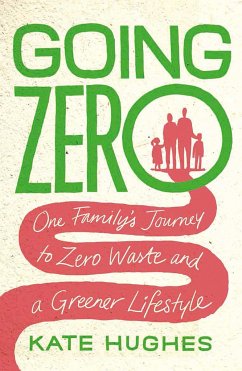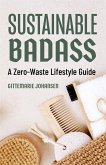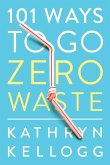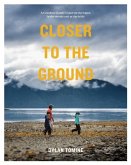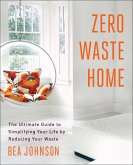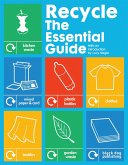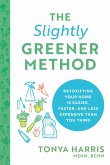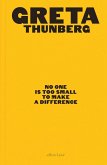Kate Hughes
Going Zero: One Family's Journey to Zero Waste and a Greener Lifestyle
16,99 €
inkl. MwSt.
Versandfertig in 2-4 Wochen

8 °P sammeln
Kate Hughes
Going Zero: One Family's Journey to Zero Waste and a Greener Lifestyle
- Broschiertes Buch
- Merkliste
- Auf die Merkliste
- Bewerten Bewerten
- Teilen
- Produkt teilen
- Produkterinnerung
- Produkterinnerung
The inspiring story of an ordinary family who rebelled against the waste of a lifestyle wrapped in plastic.
Andere Kunden interessierten sich auch für
![Sustainable Badass Sustainable Badass]() Gittemarie JohansenSustainable Badass22,99 €
Gittemarie JohansenSustainable Badass22,99 €![101 Ways to Go Zero Waste 101 Ways to Go Zero Waste]() Kathryn Kellogg101 Ways to Go Zero Waste22,99 €
Kathryn Kellogg101 Ways to Go Zero Waste22,99 €![Closer to the Ground Closer to the Ground]() Dylan TomineCloser to the Ground16,99 €
Dylan TomineCloser to the Ground16,99 €![Zero Waste Home Zero Waste Home]() Bea JohnsonZero Waste Home18,99 €
Bea JohnsonZero Waste Home18,99 €![Recycle: The Essential Guide Recycle: The Essential Guide]() Recycle: The Essential Guide26,99 €
Recycle: The Essential Guide26,99 €![The Slightly Greener Method The Slightly Greener Method]() Tonya HarrisThe Slightly Greener Method15,99 €
Tonya HarrisThe Slightly Greener Method15,99 €![No One Is Too Small to Make a Difference No One Is Too Small to Make a Difference]() Greta ThunbergNo One Is Too Small to Make a Difference22,99 €
Greta ThunbergNo One Is Too Small to Make a Difference22,99 €-
-
-
The inspiring story of an ordinary family who rebelled against the waste of a lifestyle wrapped in plastic.
Hinweis: Dieser Artikel kann nur an eine deutsche Lieferadresse ausgeliefert werden.
Hinweis: Dieser Artikel kann nur an eine deutsche Lieferadresse ausgeliefert werden.
Produktdetails
- Produktdetails
- Verlag: Canbury Press
- Seitenzahl: 256
- Erscheinungstermin: 31. März 2022
- Englisch
- Abmessung: 196mm x 127mm x 15mm
- Gewicht: 248g
- ISBN-13: 9781912454693
- ISBN-10: 1912454696
- Artikelnr.: 62475536
- Herstellerkennzeichnung
- Libri GmbH
- Europaallee 1
- 36244 Bad Hersfeld
- gpsr@libri.de
- Verlag: Canbury Press
- Seitenzahl: 256
- Erscheinungstermin: 31. März 2022
- Englisch
- Abmessung: 196mm x 127mm x 15mm
- Gewicht: 248g
- ISBN-13: 9781912454693
- ISBN-10: 1912454696
- Artikelnr.: 62475536
- Herstellerkennzeichnung
- Libri GmbH
- Europaallee 1
- 36244 Bad Hersfeld
- gpsr@libri.de
Kate Hughes is a national newspaper journalist and columnist. She is Money Editor for Independent.co.uk, for whom she also writes about sustainability. She is a commentator on BBC radio. She lives with her husband David and their two children in Somerset, England.
1. The Eye Opener. English journalist Kate Hughes starts a zero waste
lifestyle. Mentioning plastic pollution, going zero waste, polystyrene,
EPS, takeaway containers, marine pollution, Sea Empress tanker disaster,
impact of cattle grazing, BPA, bisphenol A, BBC Blue Planet series
2. Unravelling a Lifetime’s Training. The challenges of starting a zero
waste lifestyle. Mentioning landfill, shopping habits, farmer's market,
throwaway society, plastic pollution, the Great Pacific Garbage Patch,
supermarket shopping, microplastics, plastic carrier bags
3. Assume Nothing. Adopting a flexi diet and eating seasonally. With
breakout boxes on palm oil and slow cookers and flexi diets Mentioning
processed food,home-churned butter, slow cooker yoghurt, nanoplastic
particles, polypropylene, palm oil ingredients, eating seasonally, flexi
diet
4. Down the Drain. Learning to reduce plastic and micro plastic pollution
by using homemade cleaning agents and homemade cosmetics. Mentioning green
washing machines, volatile organic compounds, parabens, Environmental
Protection Agency, water pollution, homemade cosmetics, homemade cleaning
agents
5. Wardrobe Malfunction. Finding a way to avoid environmental damage when
buying and looking after clothes, including vintage clothes and hiring
costumes and party outfits. Breakout boxes on synthetic fibres and the
trust cost of fast fashion
6. Loving the Preloved. Reducing household waste by repairing, repurposing
and buying products second-hand, including sourcing on auction sites such
as eBay. Breakout box on E-Waste. Mentioning preloved, pre-loved, eBay,
e-waste, Commons Environmental Audit Committee, Fairphone, Ida Auken
7. Generation Fear. Creating happy family and looking after environmental
concerns about, and for, children. Breakout box on eco-anxious children.
Mentioning Christmas toys, plastic toys, laminator, sequins, McDonald's
Happy Meals, PVA glue
8. Throw Away Tradition. Celebrating festivals such as Christmas, Easter
and Halloween in a zero-waste household. Breakout box on the environmental
cost of Christmas. Green Christmas, Beltane, recycled wrapping paper,
Christmas dinner, Christmas carbon footprint, All Hallows’ Eve pick 'n' mix
9. Seeing It All. Using sustainable transport by reducing air travel,
taking the train, and buying and using an electric car. Breakout box on
production of electric (EV) cars including environmental cost of lithium
battery. Mentioning diesel and petrol costs, Jaguar iPace, second-hand EV
10. Widening the Net. Broadening out the family's attempts to reduce carbon
by eating out sustainably and having ethical holidays. Breakout boxes on a
zero waste restaurant: La Petite Bouchée in Witheridge in Devon, and the
UK's international environmental performance. Mentioning Earth Overshoot
Day
11. Green Energy. Switching the family to green energy and avoiding
electricity and gas greenwashing; assessing UK energy mix, including the
proportion of renewable power; and improving household energy efficiency.
National Grid, renewable energy supplier, renewable energy tariff,
Renewable Energy Guarantee
12. A Bit More Zero. The role and uses of household recycling including
greenwashing by supermarkets, assessing different types of recycling by
material such as glass and plastic and aluminium drinks cans. How to use a
garden to provide food. Breakout box on shipping UK waste abroad.
13. Ghost in the Machine. Reducing waste from miscellaneous sources such as
junk mail, printed catalogues; going paper-free; reducing junk emails,
using a green browser Ecosia, and reducing purchases of new tech such as
phones and PCs, and reducing energy waste from streaming services such as
Netflix
14. Follow the Money. The family decide to green their finances, by
assessing the sustainability of their pensions, investments and savings. As
a financial journalist, Kate knows where to look and assesses ESG Funds
(Environment, Social and Governance)
15. Meeting Ourselves Coming Back. Taking stock of the family's journey,
including drawbacks such as one parent's employment in motorsport and plans
to launch organic farming. Breakout box on carbon offsetting. Motorsport
environmental responsibility, Formula e, Carbon offsetting, organic farming
16. House on Fire. A problem emerges as the family make further progress
towards their zero waste goal. Going zero waste has cut their food bill by
40% and improved many other areas of life. Mentioning the warning of an
eco-catastrophe given by António Guterres, Secretary General of the United
Nations
Top 10 Ways to Lower Your Impact. No 1: Ask yourself the three questions:
Are you comfortable about how this item or service has reached you? Are you
comfortable with its environmental impact while you use it? Are you
comfortable about what happens to it afterwards?
Acknowledgements. Author Kate Hughes thanks everyone who has made her
journey to a green lifestyle and later the writing of this sustainability
guide, including contacts at the UK Environment Agency
Source of Information. Such as the Intergovernmental Panel on Climate
Change, United Nations Environment Programme, UK Environmental Audit
Committee, Green Alliance, ShareAction, Make My Money Matter, Rainforest
Alliance Network, Greenpeace, Monga Bay, Taskforce for Climate-related
Financial Disclosures
More Reading. Such as: Zero Waste Home; Seasonal Food: A Guide to What’s in
Season When and Why; Doughnut Economics; There Is No Planet B; How to Live
a Low-Carbon Life; The Uninhabitable Earth; How Bad are Bananas?; Feral;
Wilding: The Return to Nature of a British Farm; This Changes Everything
References. A full list of source material for important facts on the cost
of modern lifestyles, the switch to sustainable living and the benefits of
modern families putting less strain on the Earth
lifestyle. Mentioning plastic pollution, going zero waste, polystyrene,
EPS, takeaway containers, marine pollution, Sea Empress tanker disaster,
impact of cattle grazing, BPA, bisphenol A, BBC Blue Planet series
2. Unravelling a Lifetime’s Training. The challenges of starting a zero
waste lifestyle. Mentioning landfill, shopping habits, farmer's market,
throwaway society, plastic pollution, the Great Pacific Garbage Patch,
supermarket shopping, microplastics, plastic carrier bags
3. Assume Nothing. Adopting a flexi diet and eating seasonally. With
breakout boxes on palm oil and slow cookers and flexi diets Mentioning
processed food,home-churned butter, slow cooker yoghurt, nanoplastic
particles, polypropylene, palm oil ingredients, eating seasonally, flexi
diet
4. Down the Drain. Learning to reduce plastic and micro plastic pollution
by using homemade cleaning agents and homemade cosmetics. Mentioning green
washing machines, volatile organic compounds, parabens, Environmental
Protection Agency, water pollution, homemade cosmetics, homemade cleaning
agents
5. Wardrobe Malfunction. Finding a way to avoid environmental damage when
buying and looking after clothes, including vintage clothes and hiring
costumes and party outfits. Breakout boxes on synthetic fibres and the
trust cost of fast fashion
6. Loving the Preloved. Reducing household waste by repairing, repurposing
and buying products second-hand, including sourcing on auction sites such
as eBay. Breakout box on E-Waste. Mentioning preloved, pre-loved, eBay,
e-waste, Commons Environmental Audit Committee, Fairphone, Ida Auken
7. Generation Fear. Creating happy family and looking after environmental
concerns about, and for, children. Breakout box on eco-anxious children.
Mentioning Christmas toys, plastic toys, laminator, sequins, McDonald's
Happy Meals, PVA glue
8. Throw Away Tradition. Celebrating festivals such as Christmas, Easter
and Halloween in a zero-waste household. Breakout box on the environmental
cost of Christmas. Green Christmas, Beltane, recycled wrapping paper,
Christmas dinner, Christmas carbon footprint, All Hallows’ Eve pick 'n' mix
9. Seeing It All. Using sustainable transport by reducing air travel,
taking the train, and buying and using an electric car. Breakout box on
production of electric (EV) cars including environmental cost of lithium
battery. Mentioning diesel and petrol costs, Jaguar iPace, second-hand EV
10. Widening the Net. Broadening out the family's attempts to reduce carbon
by eating out sustainably and having ethical holidays. Breakout boxes on a
zero waste restaurant: La Petite Bouchée in Witheridge in Devon, and the
UK's international environmental performance. Mentioning Earth Overshoot
Day
11. Green Energy. Switching the family to green energy and avoiding
electricity and gas greenwashing; assessing UK energy mix, including the
proportion of renewable power; and improving household energy efficiency.
National Grid, renewable energy supplier, renewable energy tariff,
Renewable Energy Guarantee
12. A Bit More Zero. The role and uses of household recycling including
greenwashing by supermarkets, assessing different types of recycling by
material such as glass and plastic and aluminium drinks cans. How to use a
garden to provide food. Breakout box on shipping UK waste abroad.
13. Ghost in the Machine. Reducing waste from miscellaneous sources such as
junk mail, printed catalogues; going paper-free; reducing junk emails,
using a green browser Ecosia, and reducing purchases of new tech such as
phones and PCs, and reducing energy waste from streaming services such as
Netflix
14. Follow the Money. The family decide to green their finances, by
assessing the sustainability of their pensions, investments and savings. As
a financial journalist, Kate knows where to look and assesses ESG Funds
(Environment, Social and Governance)
15. Meeting Ourselves Coming Back. Taking stock of the family's journey,
including drawbacks such as one parent's employment in motorsport and plans
to launch organic farming. Breakout box on carbon offsetting. Motorsport
environmental responsibility, Formula e, Carbon offsetting, organic farming
16. House on Fire. A problem emerges as the family make further progress
towards their zero waste goal. Going zero waste has cut their food bill by
40% and improved many other areas of life. Mentioning the warning of an
eco-catastrophe given by António Guterres, Secretary General of the United
Nations
Top 10 Ways to Lower Your Impact. No 1: Ask yourself the three questions:
Are you comfortable about how this item or service has reached you? Are you
comfortable with its environmental impact while you use it? Are you
comfortable about what happens to it afterwards?
Acknowledgements. Author Kate Hughes thanks everyone who has made her
journey to a green lifestyle and later the writing of this sustainability
guide, including contacts at the UK Environment Agency
Source of Information. Such as the Intergovernmental Panel on Climate
Change, United Nations Environment Programme, UK Environmental Audit
Committee, Green Alliance, ShareAction, Make My Money Matter, Rainforest
Alliance Network, Greenpeace, Monga Bay, Taskforce for Climate-related
Financial Disclosures
More Reading. Such as: Zero Waste Home; Seasonal Food: A Guide to What’s in
Season When and Why; Doughnut Economics; There Is No Planet B; How to Live
a Low-Carbon Life; The Uninhabitable Earth; How Bad are Bananas?; Feral;
Wilding: The Return to Nature of a British Farm; This Changes Everything
References. A full list of source material for important facts on the cost
of modern lifestyles, the switch to sustainable living and the benefits of
modern families putting less strain on the Earth
1. The Eye Opener. English journalist Kate Hughes starts a zero waste
lifestyle. Mentioning plastic pollution, going zero waste, polystyrene,
EPS, takeaway containers, marine pollution, Sea Empress tanker disaster,
impact of cattle grazing, BPA, bisphenol A, BBC Blue Planet series
2. Unravelling a Lifetime’s Training. The challenges of starting a zero
waste lifestyle. Mentioning landfill, shopping habits, farmer's market,
throwaway society, plastic pollution, the Great Pacific Garbage Patch,
supermarket shopping, microplastics, plastic carrier bags
3. Assume Nothing. Adopting a flexi diet and eating seasonally. With
breakout boxes on palm oil and slow cookers and flexi diets Mentioning
processed food,home-churned butter, slow cooker yoghurt, nanoplastic
particles, polypropylene, palm oil ingredients, eating seasonally, flexi
diet
4. Down the Drain. Learning to reduce plastic and micro plastic pollution
by using homemade cleaning agents and homemade cosmetics. Mentioning green
washing machines, volatile organic compounds, parabens, Environmental
Protection Agency, water pollution, homemade cosmetics, homemade cleaning
agents
5. Wardrobe Malfunction. Finding a way to avoid environmental damage when
buying and looking after clothes, including vintage clothes and hiring
costumes and party outfits. Breakout boxes on synthetic fibres and the
trust cost of fast fashion
6. Loving the Preloved. Reducing household waste by repairing, repurposing
and buying products second-hand, including sourcing on auction sites such
as eBay. Breakout box on E-Waste. Mentioning preloved, pre-loved, eBay,
e-waste, Commons Environmental Audit Committee, Fairphone, Ida Auken
7. Generation Fear. Creating happy family and looking after environmental
concerns about, and for, children. Breakout box on eco-anxious children.
Mentioning Christmas toys, plastic toys, laminator, sequins, McDonald's
Happy Meals, PVA glue
8. Throw Away Tradition. Celebrating festivals such as Christmas, Easter
and Halloween in a zero-waste household. Breakout box on the environmental
cost of Christmas. Green Christmas, Beltane, recycled wrapping paper,
Christmas dinner, Christmas carbon footprint, All Hallows’ Eve pick 'n' mix
9. Seeing It All. Using sustainable transport by reducing air travel,
taking the train, and buying and using an electric car. Breakout box on
production of electric (EV) cars including environmental cost of lithium
battery. Mentioning diesel and petrol costs, Jaguar iPace, second-hand EV
10. Widening the Net. Broadening out the family's attempts to reduce carbon
by eating out sustainably and having ethical holidays. Breakout boxes on a
zero waste restaurant: La Petite Bouchée in Witheridge in Devon, and the
UK's international environmental performance. Mentioning Earth Overshoot
Day
11. Green Energy. Switching the family to green energy and avoiding
electricity and gas greenwashing; assessing UK energy mix, including the
proportion of renewable power; and improving household energy efficiency.
National Grid, renewable energy supplier, renewable energy tariff,
Renewable Energy Guarantee
12. A Bit More Zero. The role and uses of household recycling including
greenwashing by supermarkets, assessing different types of recycling by
material such as glass and plastic and aluminium drinks cans. How to use a
garden to provide food. Breakout box on shipping UK waste abroad.
13. Ghost in the Machine. Reducing waste from miscellaneous sources such as
junk mail, printed catalogues; going paper-free; reducing junk emails,
using a green browser Ecosia, and reducing purchases of new tech such as
phones and PCs, and reducing energy waste from streaming services such as
Netflix
14. Follow the Money. The family decide to green their finances, by
assessing the sustainability of their pensions, investments and savings. As
a financial journalist, Kate knows where to look and assesses ESG Funds
(Environment, Social and Governance)
15. Meeting Ourselves Coming Back. Taking stock of the family's journey,
including drawbacks such as one parent's employment in motorsport and plans
to launch organic farming. Breakout box on carbon offsetting. Motorsport
environmental responsibility, Formula e, Carbon offsetting, organic farming
16. House on Fire. A problem emerges as the family make further progress
towards their zero waste goal. Going zero waste has cut their food bill by
40% and improved many other areas of life. Mentioning the warning of an
eco-catastrophe given by António Guterres, Secretary General of the United
Nations
Top 10 Ways to Lower Your Impact. No 1: Ask yourself the three questions:
Are you comfortable about how this item or service has reached you? Are you
comfortable with its environmental impact while you use it? Are you
comfortable about what happens to it afterwards?
Acknowledgements. Author Kate Hughes thanks everyone who has made her
journey to a green lifestyle and later the writing of this sustainability
guide, including contacts at the UK Environment Agency
Source of Information. Such as the Intergovernmental Panel on Climate
Change, United Nations Environment Programme, UK Environmental Audit
Committee, Green Alliance, ShareAction, Make My Money Matter, Rainforest
Alliance Network, Greenpeace, Monga Bay, Taskforce for Climate-related
Financial Disclosures
More Reading. Such as: Zero Waste Home; Seasonal Food: A Guide to What’s in
Season When and Why; Doughnut Economics; There Is No Planet B; How to Live
a Low-Carbon Life; The Uninhabitable Earth; How Bad are Bananas?; Feral;
Wilding: The Return to Nature of a British Farm; This Changes Everything
References. A full list of source material for important facts on the cost
of modern lifestyles, the switch to sustainable living and the benefits of
modern families putting less strain on the Earth
lifestyle. Mentioning plastic pollution, going zero waste, polystyrene,
EPS, takeaway containers, marine pollution, Sea Empress tanker disaster,
impact of cattle grazing, BPA, bisphenol A, BBC Blue Planet series
2. Unravelling a Lifetime’s Training. The challenges of starting a zero
waste lifestyle. Mentioning landfill, shopping habits, farmer's market,
throwaway society, plastic pollution, the Great Pacific Garbage Patch,
supermarket shopping, microplastics, plastic carrier bags
3. Assume Nothing. Adopting a flexi diet and eating seasonally. With
breakout boxes on palm oil and slow cookers and flexi diets Mentioning
processed food,home-churned butter, slow cooker yoghurt, nanoplastic
particles, polypropylene, palm oil ingredients, eating seasonally, flexi
diet
4. Down the Drain. Learning to reduce plastic and micro plastic pollution
by using homemade cleaning agents and homemade cosmetics. Mentioning green
washing machines, volatile organic compounds, parabens, Environmental
Protection Agency, water pollution, homemade cosmetics, homemade cleaning
agents
5. Wardrobe Malfunction. Finding a way to avoid environmental damage when
buying and looking after clothes, including vintage clothes and hiring
costumes and party outfits. Breakout boxes on synthetic fibres and the
trust cost of fast fashion
6. Loving the Preloved. Reducing household waste by repairing, repurposing
and buying products second-hand, including sourcing on auction sites such
as eBay. Breakout box on E-Waste. Mentioning preloved, pre-loved, eBay,
e-waste, Commons Environmental Audit Committee, Fairphone, Ida Auken
7. Generation Fear. Creating happy family and looking after environmental
concerns about, and for, children. Breakout box on eco-anxious children.
Mentioning Christmas toys, plastic toys, laminator, sequins, McDonald's
Happy Meals, PVA glue
8. Throw Away Tradition. Celebrating festivals such as Christmas, Easter
and Halloween in a zero-waste household. Breakout box on the environmental
cost of Christmas. Green Christmas, Beltane, recycled wrapping paper,
Christmas dinner, Christmas carbon footprint, All Hallows’ Eve pick 'n' mix
9. Seeing It All. Using sustainable transport by reducing air travel,
taking the train, and buying and using an electric car. Breakout box on
production of electric (EV) cars including environmental cost of lithium
battery. Mentioning diesel and petrol costs, Jaguar iPace, second-hand EV
10. Widening the Net. Broadening out the family's attempts to reduce carbon
by eating out sustainably and having ethical holidays. Breakout boxes on a
zero waste restaurant: La Petite Bouchée in Witheridge in Devon, and the
UK's international environmental performance. Mentioning Earth Overshoot
Day
11. Green Energy. Switching the family to green energy and avoiding
electricity and gas greenwashing; assessing UK energy mix, including the
proportion of renewable power; and improving household energy efficiency.
National Grid, renewable energy supplier, renewable energy tariff,
Renewable Energy Guarantee
12. A Bit More Zero. The role and uses of household recycling including
greenwashing by supermarkets, assessing different types of recycling by
material such as glass and plastic and aluminium drinks cans. How to use a
garden to provide food. Breakout box on shipping UK waste abroad.
13. Ghost in the Machine. Reducing waste from miscellaneous sources such as
junk mail, printed catalogues; going paper-free; reducing junk emails,
using a green browser Ecosia, and reducing purchases of new tech such as
phones and PCs, and reducing energy waste from streaming services such as
Netflix
14. Follow the Money. The family decide to green their finances, by
assessing the sustainability of their pensions, investments and savings. As
a financial journalist, Kate knows where to look and assesses ESG Funds
(Environment, Social and Governance)
15. Meeting Ourselves Coming Back. Taking stock of the family's journey,
including drawbacks such as one parent's employment in motorsport and plans
to launch organic farming. Breakout box on carbon offsetting. Motorsport
environmental responsibility, Formula e, Carbon offsetting, organic farming
16. House on Fire. A problem emerges as the family make further progress
towards their zero waste goal. Going zero waste has cut their food bill by
40% and improved many other areas of life. Mentioning the warning of an
eco-catastrophe given by António Guterres, Secretary General of the United
Nations
Top 10 Ways to Lower Your Impact. No 1: Ask yourself the three questions:
Are you comfortable about how this item or service has reached you? Are you
comfortable with its environmental impact while you use it? Are you
comfortable about what happens to it afterwards?
Acknowledgements. Author Kate Hughes thanks everyone who has made her
journey to a green lifestyle and later the writing of this sustainability
guide, including contacts at the UK Environment Agency
Source of Information. Such as the Intergovernmental Panel on Climate
Change, United Nations Environment Programme, UK Environmental Audit
Committee, Green Alliance, ShareAction, Make My Money Matter, Rainforest
Alliance Network, Greenpeace, Monga Bay, Taskforce for Climate-related
Financial Disclosures
More Reading. Such as: Zero Waste Home; Seasonal Food: A Guide to What’s in
Season When and Why; Doughnut Economics; There Is No Planet B; How to Live
a Low-Carbon Life; The Uninhabitable Earth; How Bad are Bananas?; Feral;
Wilding: The Return to Nature of a British Farm; This Changes Everything
References. A full list of source material for important facts on the cost
of modern lifestyles, the switch to sustainable living and the benefits of
modern families putting less strain on the Earth
